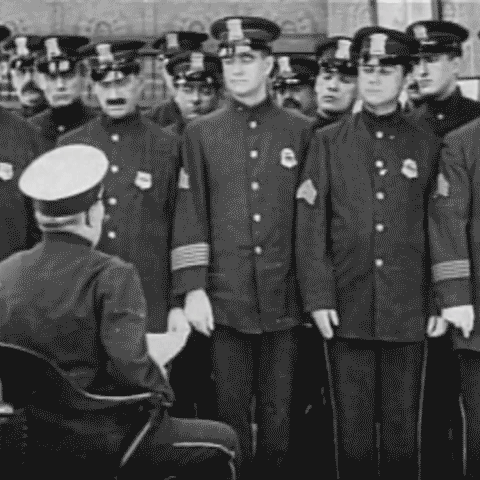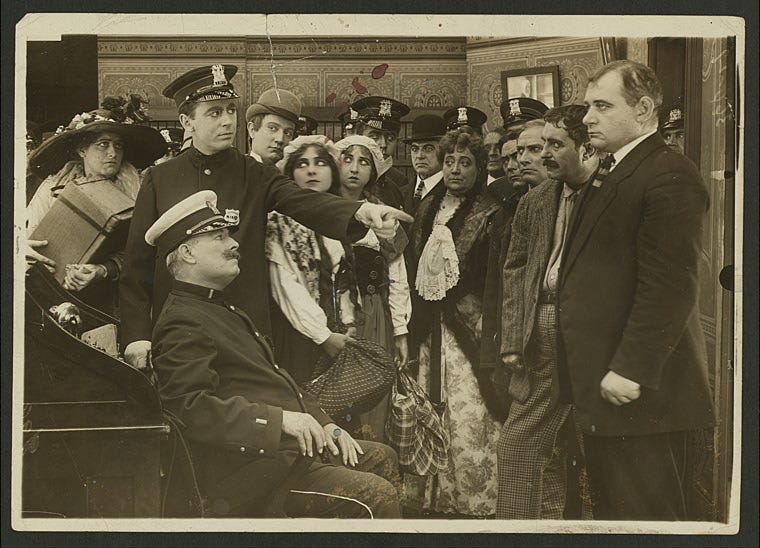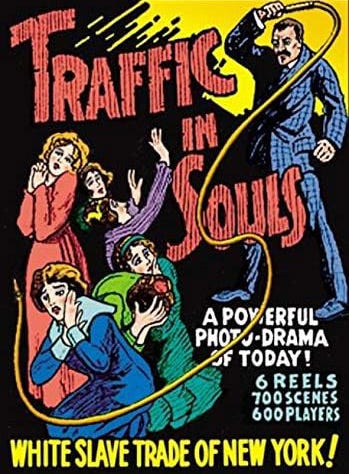GROSS/1 1913 - Traffic in Souls - an organised-crime drama with an ultra-modern remote surveillance storyline
An extraordinarily modern movie - and a prototype for a whole new category.
I’m watching the top-grossing film from every year since 1913, which is when they started recording that sort of thing. I’ve got a list on Letterboxd.
TRAFFIC IN SOULS: WHILE NEW YORK SLEEPS, GEORGE LOANE TUCKER, UNIVERSAL, 1913
The first film is essentially a pre-code exploitation flick: kidnapping, pimps and prostitutes, corruption and hypocrisy in high places. The theme capitalises on the popular dread in this period of ‘white slavery’, what we would now call human trafficking.
This film's got everything: almost thirty years before the first recognised film noir, fifty years before all those gritty 1970s studio explorations of urban crime and degradation. There's cross-border organised crime, the kidnapping and trafficking of vulnerable immigrants (Ellis Island is an early location), prostitution, money-laundering, the hypocrisy of the urban elite, the tense meeting of old and new money (and a fancy sweetshop that turns out to be a front for the crime gang).
The film has a remote surveillance storyline (surely the first?) that features an audio relay between offices, a not-very-well-concealed mic, wax cylinders, a kind of recording tablet that looks a lot like an iPad. Our boyfriend-girlfriend heroes work as a team, set up their kit - laying cable, hiding bugs, swapping recording cylinders - like they're from CSI - it's kind of disorienting to see this ease with modern tech in a film from years before the electronic mic and the tape recorder. A wireless ship-to-shore telegram also makes an important appearance (I can imagine the producers demanding more cool tech for the younger crowd). We really are at the birth of the communication revolution - the critical evidence in the case against our villain is a wax cylinder (although there’s no evidence of a warrant so I’m worried the case might not have held up at appeal).
There's an 'invalid inventor' (the heroine’s father) who is essentially a sketch for Harry Caul from The Conversation and a dramatic police raid that's close in scale and execution to the SWAT raids of contemporary police drama. Dozens of coppers, armed with night-sticks and axes, crowd into a room at the precinct where they're briefed by their captain about the infamy they're about to uncover (if he actually says "be safe out there" it doesn’t make it into the intertitles). They then stream down the steps out of the station purposefully and pile into a convoy of cars. Watches are synchronised, the operation is triggered by a rooftop lookout (although he just blows his whistle, really). The raid's denouement is dramatic (no spoilers here).
A big cast includes every possible archetype of disreputable America - the procurer, the blowsy madame, the shifty pimp, the enforcer, the hard-working immigrant, the fallen innocent, the unscrupulous middle-man, the courageous cop working on a hunch. The procurers wear nice suits and straw boaters, the enforcers trilbys or, in one case, a splendid squashed pork-pie hat. Respectable ladies and whorehouse Madames wear the same, high-Edwardian corsetry and big feather hats. Men and women alike count big wads of ill-gotten cash ostentatiously, like Scarface, and move between street corners, brothels and fancy offices with the confidence of generations of movie hoodlums.
The villain here is a wealthy man, William Trubus, a morally-bankrupt confectionery mogul whose candy business is a front for prostitution on a grand scale. If his administrative workforce is anything to go by it’s a huge enterprise. We visit a bustling office and two brothels and assume the existence of more. Nothing backstreet about this operation.
In America this is the era of the plutocrat, the robber baron and the money trust. The year of release is right at the peak of the antitrust era, the year of the Pujo Committee and AT&T’s first run-in with government. In the following year the Clayton Act came into force. President Taft , who had just left office when the film came out, was an antitrust President and action against the monopolists was central to Wilson’s post-war platform too. The popular press is alive with stories about their malfeasance and their comeuppance. Trubus, our villain, may be a self-made entrepreneur (there's a storyline about the family's introduction to society via the daughter's marriage to "the greatest society catch of the season" - a monocled gent with no personality) but he’s uncomplicatedly wicked. Are there any sympathetic movie portrayals of businessmen from this period?
Mary and Larry, the central couple, are sweethearts - shopgirl and cop - the kind of civilian-police pairing that went on to be central to dozens of movie narratives, although this is more of a loving collaboration than the kind of messed-up marriages of more recent cop movies, where plots turn on the damage done by the pressures of being a police, by the single-minded, round-the-clock pursuit of evil, by late-night stake-outs and compulsory bourbon (see Die Hard, Heat, Mall Cop, Thunder Road, a thousand TV cop dramas). The lesson from Traffic in Souls is that the couple that polices together stays together.
There's a very visible absence in the film, though. The figure we don't meet is the punter. Not a single John appears. The seedy rooms and bleak hallways of the various brothels are busy with maids, pimps and prostitutes but not a customer is to be seen. Was it too much for even a pre-code feature to include the actual purchaser of sex? Would it have spoilt the neat two-sided narrative to introduce a complicating third?
Traffic in Souls is a splendid, complex, big-hearted action movie, an essentially perfect 88 minutes of entertainment from a director who, if we’re honest, didn't really break through in his other work. When I mentioned the film on Twitter, film composer and historian Neil Brand called it "a bona fide one-off masterpiece" and used the hashtag #BetterThanDWGriffith, which is intriguing, because 1915's biggest-grossing movie was Griffith's The Birth of a Nation, so I'll be watching it soon.
I don’t have a good reason for this but I like the fact that there are two Irish immigrants in the cast: William H. Turner (the invalid inventor) who was from Cork and appeared in 46 motion pictures between 1913 and 1938, and Matt Moore (the cop) from Mayo, 221 pictures, between 1912 and 1958.






